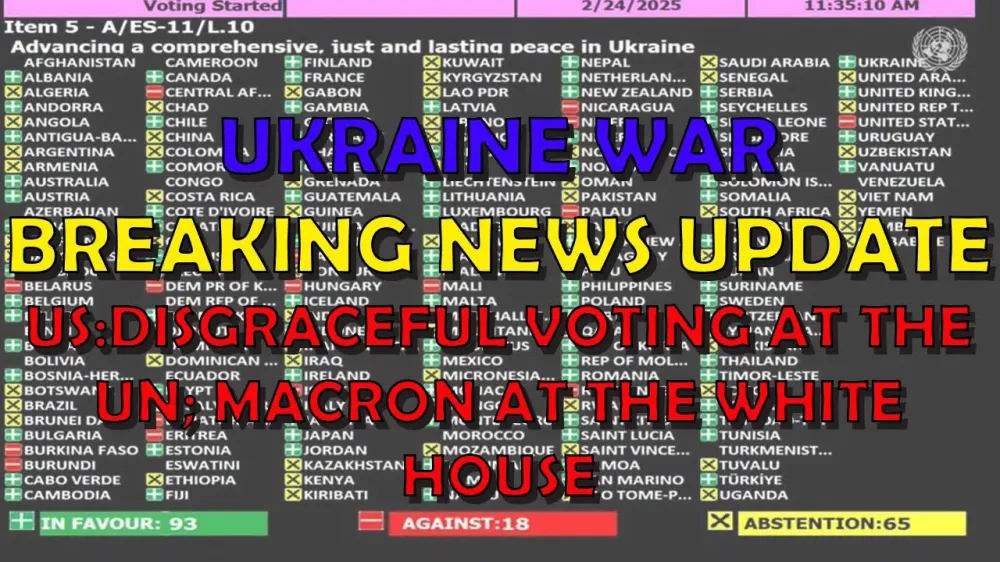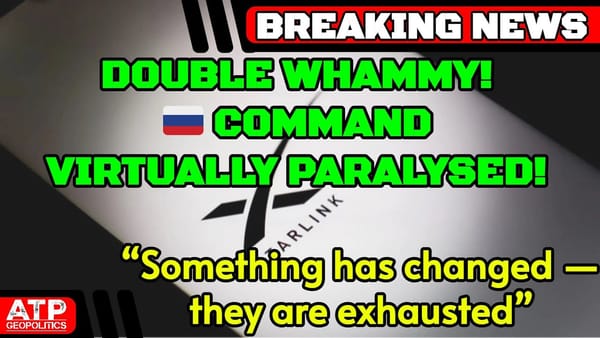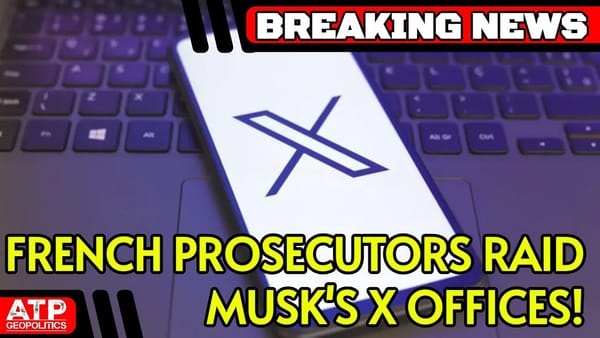Ukraine War BREAKING NEWS: US Disgrace at the UN; Macron at the White House
Video on Youtube
Table of Contents 📖
"It's just incredible, incredible how different the United States is now from a month ago."
🤖💭 AI Plan (pre task) - the AI's step by step thought process
Your thought process
Hello Team
🎦 00:00-00:14⏩
- Jonathan welcomes viewers to a Ukraine War breaking news update.
- The update concerns the United Nations and French President Macron's visit to the White House, where he has just finished speaking with President Trump in the Oval Office.
Trump's inaccurate statements on Ukraine aid at White House
🎦 00:15-00:31⏩
- Jonathan highlights that Trump "regurgitated loads of lies and talking points" regarding Ukraine.
- Trump's statements were not corrected by Macron during their meeting.
Macron's diplomatic approach to Trump
🎦 00:32-00:42⏩
- Jonathan speculates that Macron may have avoided correcting Trump directly to maintain a positive tone at the beginning of their meeting.
- He suggests that directly contradicting Trump might have been counterproductive at that moment.
Trump demands return of $350bn Ukraine aid; Macron urged to defend Europe
🎦 00:42-00:55⏩
- Trump reiterated his demand to "get back" the "$350 billion" allegedly given to Ukraine.
- Jonathan expresses hope that Macron will strongly advocate for Europe's interests in his discussions with Trump.
Contradictory statements from Trump on Ukraine
🎦 00:56-01:09⏩
- Jonathan points out a contradiction between Trump's public statement and his remarks in the Oval Office.
- Trump's released statement appears to go against what he said earlier in the Oval Office meeting.
Trump prioritises financial gain from US-Ukraine mineral deal
🎦 01:09-01:24⏩
- According to reports, Trump's focus is solely on financial matters, particularly regarding the US-Ukraine minerals deal.
- He emphasised that this deal is about "getting America's money back".
- Trump framed the deal as an "economic partnership" designed to recoup billions sent to Ukraine.
Trump's G7 statement: Ukraine war anniversary and US-Ukraine mineral deal
🎦 01:24-02:07⏩
- Jonathan reads Trump's statement about his meeting with Macron in the Oval Office, which was convened by Canada (G7 chair) to mark the third anniversary of the Russia-Ukraine war.
- Trump falsely claimed the war "would never have started if I was president".
- The statement highlights the G7's goal to end the war and Trump's emphasis on the "vital critical minerals and rare earths deal" between the US and Ukraine.
- He describes this deal as an "economic partnership" to recoup "tens of billions".
Discrepancy in Trump's figures on Ukraine aid
🎦 02:07-02:38⏩
- Jonathan notes a significant discrepancy in the figures Trump is using for US aid to Ukraine.
- In his statement, Trump mentioned "tens of billions," whereas in the Oval Office, he cited "$350 billion".
- Jonathan recalls Trump previously mentioning figures as high as "$500 billion" and even "$200 billion" at different times.
- He likens Trump's inflation of the aid figure to exaggerating the size of a fish he caught.
Possible correction of Trump's aid figures by Macron
🎦 02:39-02:49⏩
- Jonathan speculates that Trump's use of "tens of billions" in his statement might indicate that he was corrected on the inflated "$350 billion" figure, possibly by Macron during their meeting.
Trump links military aid to Ukraine's economy and post-war development
🎦 02:49-03:04⏩
- Trump's statement mentions military equipment sent to Ukraine while also aiming to help Ukraine's economy grow as the war ends.
Trump claims 'serious discussions' with Putin on US-Russia economic deals
🎦 03:04-03:13⏩
- Trump stated he is in "serious discussions" with Putin regarding ending the war and "major economic development transactions" between the US and Russia.
- Jonathan sarcastically remarks on Trump's transactional approach, noting that these US-Russia talks seemingly exclude Ukraine.
Zelensky's virtual participation at G7 summit and communication with Trump
🎦 03:14-03:26⏩
- Jonathan believes that President Zelensky also participated in the G7 summit, likely virtually.
- He presumes Zelensky may have also spoken with Trump during this G7 summit.
US votes against UN resolution condemning Russia as aggressor
🎦 03:27-03:54⏩
- Jonathan expresses strong disapproval of the United States' stance at the UN regarding a resolution on the war in Ukraine.
- He clarifies his criticism is directed at the "Trump administration," not the American people in general.
- He describes the US position as "disgraceful".
UN resolution demands full Russian withdrawal from Ukraine
🎦 03:54-04:11⏩
- Jonathan explains that annually, the UN releases a statement about the war in Ukraine.
- The US usually takes a leading role in drafting this statement.
- This year's UN resolution specifically names Russia as the "aggressor" and demands the complete withdrawal of Russian forces from Ukraine's internationally recognised borders.
US, Russia, and Israel's non-support of UN resolution contrasts with democratic nations
🎦 04:12-04:24⏩
- The United States & Israel, surprisingly, voted against the UN resolution, joining Russia, Belarus & North Korea.
- Jonathan highlights that "every free democratic country around the globe" voted in favour of the resolution, except for the US.
Elliot Higgins' commentary and list of nations not supporting UN resolution
🎦 04:24-04:47⏩
- Jonathan quotes Elliot Higgins (from Bellingcat/Bannan Cat) who commented that "the age of US international leadership is dead and buried" in response to the US vote against the resolution.
- 18 nations in total voted against the statement condemning Russia as the aggressor.
- Jonathan lists these 18 nations.
Geopolitical implications of nations abstaining from UN resolution; US stance criticised
🎦 04:47-05:28⏩
- Jonathan categorises the countries that voted against the resolution, grouping them into Russian allies (Russia, Belarus, North Korea), nations in the Sahel region of Africa under Russian influence, and some seemingly random nations possibly under Russian influence.
- He specifically mentions Hungary and Israel as also being "deeply disappointing" in decision to vote against the resolution.
- He reiterates that the US decision to oppose the resolution is "not acceptable".
Hope for Macron's influence on Trump's Ukraine policy through diplomacy
🎦 05:29-05:44⏩
- Despite the negative news regarding the US at the UN, Jonathan expresses some hope that Macron might positively influence Trump's stance on Ukraine.
- He notes Macron is employing a "charm offensive" approach.
- This is in contrast to a confrontational strategy against the US.
Macron's diplomatic strategy to potentially benefit Ukraine
🎦 05:44-05:58⏩
- Jonathan suggests that Macron's diplomatic, non-confrontational approach towards the US might yield positive outcomes for Ukraine.
Jonathan expresses concern over US shift in stance on Ukraine at UN
🎦 05:58-06:20⏩
- Jonathan reiterates his deep disappointment and concern that the US did not vote in favour of the "obvious resolution" at the UN.
- He emphasizes how significantly the US position has changed in just the last month, describing it as "incredible".
Unconfirmed reports of Macron offering security guarantees to Ukraine
🎦 06:20-06:38⏩
- Jonathan mentions unconfirmed claims from some sources that Macron has made a statement about offering security guarantees to Ukraine.
- However, he states he has not seen any details or confirmation of this, including from the Oval Office announcements.
- He suggests this might be something that emerges later.
Jonathan highlights UN vote as key takeaway
🎦 06:38-06:47⏩
- Jonathan reiterates that the main point he wanted to convey is the situation at the United Nations.
- He expresses that the US voting against the UN resolution is the issue that has most surprised and disturbed him ("blown my mind").
Wrap up
🎦 06:47-07:08⏩
- Jonathan concludes his update.
- He mentions he will be on Andrew Mercado's channel later for a panel discussion about the third year anniversary of the war and encourages viewers to watch it.
- He signs off, telling viewers to take care and speak soon.
🤖❓ AI Debrief (post task) - anything the AI didn't understand
No queries, understood everything.
🤖💭 AI Plan (pre task) - the AI's step by step thought process
My thought process for generating the XML output involved the following steps: Decomposition of the Request: I first broke down the user's request into its core components: summarise a YouTube transcript, follow specific formatting rules, output in XML, and address six distinct tasks. I noted the importance of British English, Ukrainian spellings, and the persona of ATP Geopolitics' editor. Planning the XML Structure: I reviewed the provided XML structure template and mentally mapped each task to its corresponding XML tags. This helped me visualize the final output and ensure I addressed all required elements. I paid close attention to the repeated ``, ``, and `` tags, understanding that these would be generated iteratively for each topic identified in the transcript. Crucially, I noted the warning about using `` and not `` for the timestamps. Task 1 (Title, Date, Part) Execution: I extracted the video title "Ukraine War BREAKING NEWS (20250224): US Disgrace at the UN; Macron at the White House" and applied the rules. Title: Removed the date/part identifier "(20250224)" to get "Ukraine War BREAKING NEWS: US Disgrace at the UN; Macron at the White House". Date: Converted "20250224" to British format "24/02/2025". Part: Identified that there was no part identifier (no letter after the date), so the `` tag would be empty. I then created the XML tags for Task 1. Task 2 (Topic Titles) & Task 3 (Topic Timestamps) & Task 4 (Topic Summaries) - Iterative Process: I read through the transcript chunk by chunk, guided by the timestamps. For each chunk, I determined the main topic of discussion. I aimed for specific, quantified, and granular topic titles as instructed. I considered the examples provided ("good" and "bad") to ensure my titles were informative. Topic Identification and Titling: I started with the "Hello Team" introduction (Topic 1). Then, I moved through the transcript sequentially. I identified topics based on shifts in subject matter. For example, the discussion about Trump's statements became a topic, followed by Macron's role, then the UN resolution, etc. I tried to separate distinct news items or points of analysis into separate topics. Timestamp Extraction: Simultaneously with identifying topics, I noted the start and end timestamps for each topic directly from the transcript, ensuring accuracy. Summary Writing: After titling and timestamping a topic, I wrote a concise summary of the key points within that topic's timeframe. I focused on capturing Jonathan's analysis, opinions, and any key information like sources or specific details mentioned. I used bullet points to structure the summaries and considered using bold/italics for emphasis but decided against it for this particular transcript as it didn't seem necessary for clarity in this case. I made sure to use British English and Ukrainian spellings (though no Ukrainian place names appeared in this transcript). Iteration and Refinement: I mentally reviewed the topic titles and summaries as I went, ensuring they were distinct and didn't overlap unnecessarily. I checked that the timestamps covered the entire video duration without significant gaps. I aimed for a logical flow of topics that reflected the video's structure. I made sure to include the "Wrap up" topic at the end. Task 5 (Quote) Selection: After completing the topic summaries, I re-read the transcript looking for a quote that was significant, thought-provoking, or representative of Jonathan's perspective. I chose "It's just incredible, incredible how different the United States is now from a month ago." because it succinctly captures Jonathan's surprise and concern about the shift in US foreign policy. I ensured the quote made sense out of context and corrected any minor punctuation or hesitation issues. Task 6 (Queries): I mentally reviewed my understanding of the transcript and the tasks. I concluded that I understood everything and didn't have any queries for this particular transcript, so I noted "No queries, understood everything." in the `🤖❓ AI Debrief (post task) - anything the AI didn't understand ` tags. XML Assembly and Validation: Finally, I assembled all the generated XML elements, ensuring they followed the correct structure and used the right tags. I double-checked that every ``, ``, and `` tag had a corresponding closing tag and that the `id` attributes were correctly numbered and matched across the topic title, timestamps, and summary. I specifically re-read the instruction about not using `` instead of `` for timestamps to avoid that error. I mentally validated the XML structure against the example provided in the instructions to confirm it was correct before outputting the final XML. This systematic, step-by-step approach, combined with careful attention to the rules and examples provided, allowed me to generate the XML summary accurately and efficiently. The iterative nature of Tasks 2-4 (topic identification, timestamping, and summarising) was key to ensuring a comprehensive and well-structured output. The final validation step was crucial to catch any potential errors before submitting the response.




